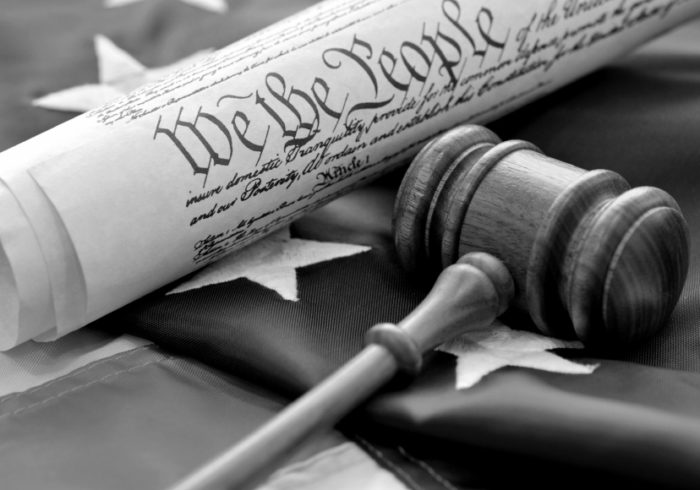What is the Seventh Amendment to the U.S. Constitution?
The Seventh Amendment to the U. S. Constitution states:
“In Suits at common law, where the value in controversy shall exceed twenty dollars, the right of trial by jury shall be preserved, and no fact tried by a jury, shall be otherwise re-examined in any Court of the United States, than according to the rules of the common law.”
The Seventh Amendment to the U. S. Constitution ensures that citizens’ civil cases can be heard and decided upon by a jury of their peers. The jury trial provides a forum for all facts to be presented, evaluated impartially and judged according to the law. But where did the concept of a “trial by jury” originate? Scholars trace this right only to the Middle Ages and the reign of William the Conqueror. Regardless of its origins, at least by the 11th Century, the right to trial by jury was firmly established in England. The Magna Carta, signed by King John on June 15, 1215, guaranteed the right to a jury trial. And during the next 100 years, the English Kings reaffirmed the Magna Carta 38 times. By the 1600’s, when the 13 colonies were founded, the right to trial by jury “had become one of the great palladiums of English liberty.” The English regarded this right “as a bulwark of liberty, and as a means of preventing oppression by the Crown.”
The colonists brought the right to trial by jury with them from England. The 1606 Charter given by James I to the Virginia Company incorporated the right to a jury trial, and by 1624 all trials in Virginia, both civil and criminal, were by jury. In 1628, the Massachusetts Bay Colony introduced jury trials, and the right to a jury trial was later codified in the Massachusetts Body of Liberties in 1641. Eventually, all colonies embraced trial by jury. Through various measures, the King of England tried to dilute the right to a jury trial. Beginning in the mid-1770’s, the colonists held a series of Congresses to address the King’s oppressive behavior. The work of the Congresses culminated in the Declaration of Independence signed on July 4, 1776. The Declaration of Independence lists the denial of “the benefits of trial by jury” as one of the grievances that led to the creation of a new nation. Today, the vast majority of states guarantee the right to trial by jury in civil cases in their constitutions. And the Seventh Amendment was ratified in 1791 as part of the Bill of Rights and preserves a citizen’s right to trial by jury in any civil trial.
Today, this fundamental right is under attack. The threat hides behind many names. Some call it tort reform, caps on damages or binding arbitration. Whatever the name, it is a danger to all of us. If someone you love is hurt by someone else’s negligence, you could lose the right to let a jury determine what compensation you should receive. If someone sues you, you would lose the right to explain your defense to a jury. Our civil jury system is the envy of the world, and one of the few systems of its kind left anywhere. Many countries used to have civil jury systems, but they were eroded over time, along with the rights of citizens.
The number of jury trials has dramatically declined in the last decade. Statistics show that less than 1% of the cases filed in Palm Beach County go to trial. There are many reasons for this, most notably the fact that many cases are resolved by agreement of the parties through the mediation process. However, many cases that are filed do not progress far, if the parties entered an enforceable arbitration provision. An arbitration is a private resolution procedure designed by corporations to resolve disputes outside of the court system. Arbitration is incorporated into many consumer contracts, including those for medical care, and cannot be negotiated away. Arbitration can be costly and slow, and is usually designed to favor the corporate interest over those of the consumer.
Another reason the right to trial by jury is in danger of disappearing is caps on damages. Certain parties, including municipalities and medical defendants, have successfully lobbied the legislature to impose caps on damages if a jury verdict is rendered against them. In Florida, there is a monetary limit of $200,000 per person, or $300,000 per incident against a government entity. If, for instance, a hospital was established through government, the most an injured victim can recover is $200,000 because of medical negligence. The only exception is the passage of what is called a “claims bill” where the matter goes before the legislature and a special law is passed allowing for a larger award. Whatever the limit, they are ultimately obstacles to the delivery of justice for injured victims and deter them from pursing justice when it may not be economically feasible to do so.
Unfortunately, civic apathy compounds the problem. The public generally does not respect jury duty. Once a treasured civic duty, it is now viewed as an inconvenience and many do whatever it takes to avoid it. The American Board of Trial Advocates (ABOTA) is an organization comprised of attorney members representing plaintiffs and defendants who value the right to trial by jury and have undertaken efforts to study the problem and make sure the right is preserved. ABOTA’s “Save Our Juries” initiative has undertaken an extension analysis of the Seventh Amendment, the problem of the disappearing jury trial and ways to solve it. Go to www.SaveOurJuries.org to learn more. Your Constitutional Right is at stake!
Share This



